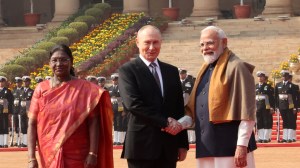NAC, think-tank and policy watchdog for UPA, is no more
The National Advisory Council, the once-powerful and influential body headed initially by Congress President Sonia Gandhi...

The National Advisory Council (NAC), the once-powerful and influential body headed initially by Congress President Sonia Gandhi to oversee the implementation of the UPA Common Minimum Programme, has now ceased to exist.
The council, which was formed amidst much political hype when the UPA came to power in 2004, was given an unnoticed and quiet burial last week as the 2007-08 financial year drew to a close.
With general elections fast approaching and the council gradually losing its clout after the exit of Sonia Gandhi two years ago, the government decided not to extend the tenure of NAC members beyond March 31. The NAC secretariat headed by former bureaucrat Arun Bhatnagar has been given time till April 30 to finish its paperwork and wind up its office at 2, Motilal Nehru Marg.
Sonia Gandhi had decided to quit as NAC Chairperson, a post with the rank of a Union Cabinet Minister, in March 2006 after it came under the scanner due to the Office-of-Profit controversy.
Confirming that the members were aware of the NAC being wrapped up, Mrinal Miri, one of the members said: “We were told at the last meeting two weeks back that this would be the final meeting of the council. As long as Ms Gandhi was the chairperson, she was able to push many things but after that it lost a bit of seriousness though meetings were held regularly.”
Set up by a government order dated May 31, 2004, the Council was serviced directly by the Prime Minister’s Office. The Central government provided the necessary funding and the office space for the council to function. The NAC had powers to obtain information from any ministry through the PMO, making it an indispensable part of government functioning.
While it was to provide inputs to the government on various legislations and monitor implementation of the National Common Minimum Programme, much of the weight was derived from the fact that its recommendations had Sonia Gandhi’s stamp of approval.
Though it performed a key political role, the NAC largely comprised non-political members. These were like-minded civil society activists like Jean Dreze and Aruna Roy, and other persons of eminence like Miri, Pratham’s Madhav Chavan, and C H Hanumantha Rao.
In its first two years, NAC took the lead in pushing through key legislation and social sector programmes like the National Rural Employment Guarantee programme, the Right to Information Act, the National Rural Health Mission and the National Rehabilitation Policy. It also sent draft legislation on the Right to Education and for setting up Gram Nyayalayas.
“It was an interesting experiment of connecting with the experience and ideas from grassroots movements. To the extent that it had to ensure the NCMP was implemented, NAC worked quite well. Had Mrs Gandhi continued, a lot of things would have been different,” said Chavan when asked about his experience in the NAC.
V. Krishnamurthy, another member, echoed similar views. “Without a political leadership who can command respect? Still, the UPA was a coalition of several political parties that had never worked together. So, this body helped to make sure that NCMP was taken seriously and implemented.”
As the NAC lost political significance, prominent members like Aruna Roy, Jean Dreze and Jaiprakash Narayan quit from the body making it a mere platform for discussion and review. The last two meetings were devoted to examining government presentations on the Accelerated Rural Drinking Water Supply programme and the development initiatives in the North-East. The final meeting was on March 13.
NAC’s History
May 31, 2004: NAC formed with Sonia Gandhi as head.
Aug 16, 2004: Rccommends RTI Act
Aug 19, 2004: Moves on NREG Act
Jan 19 & 25, 2005: Tribal policy
July 5 2005: Suggests Unorganised Sector wokers security Bill
Dec 27, 2005: Recommends Gram Nyayaylaya Bill
Jan-Feb 2006: Sonia’s post under cloud of office-of-profit controversy
Feb 18, 2006: Sonia chairs last NAC meeting
Mar 6, 2006: Rehabilitation policy sent to government.
Mar 23, 2006: Sonia Gandhi resigns from NAC
Apr-Sept 2006: Jean Dreze, Aruna Roy and Jaiprakash Narayan also resign.
Mar 31, 2008: Term of all members lapse. Govt orders to shut NAC.
- 01
- 02
- 03
- 04
- 05































